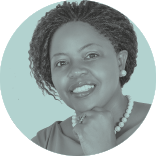Members

Allen Sophia Asiimwe is an Ugandan advocate and policy leader with over 20 years’ experience as a development advisor and practitioner. She is passionate about shaping Africa’s narrative on governance, trade, and regional integration and development issues. She has designed and managed programmes for government agencies, private sector, civil society and donors across the African region.
Allen is the Chief Technical Officer at TradeMark East Africa, charged with driving the technical and strategic direction of the organisation, now operational across 12 countries of East and Southern Africa. The goal is to increase trade through reducing cost and time of doing business, whilst also expanding capabilities for export growth and development in the region.
She is also the co-founder of the Girls For Girls Global Mentoring Initiative that seeks to Empower girls and young women to lead in changing their circumstances and their communities. The initiative is now running in 13 countries and seeks to reach 10,000 mentors and one million mentees by 2025.